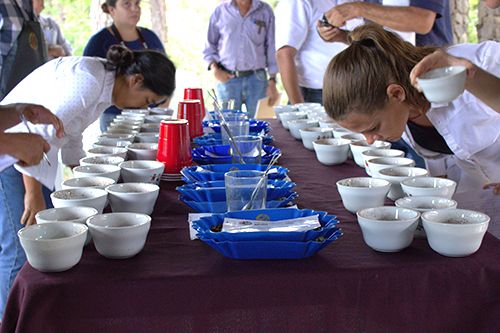
Bringing five U.S. buyers, roasters, importers and cooperators down to El Salvador last month, NCBA CLUSA reintroduced the U.S. co-op market to rehabilitated coffee cooperative farms, opening the possibility for trade.
Part of the Co-op to Co-op Trade Program, the group visited five El Salvadoran coffee cooperatives, all supported by NCBA CLUSA’s Coffee Rehabilitation Program, funded by the U.S. Department of Agriculture (USDA). Operating through 2019, the rehabilitation program aims to improve coffee quality for 7,500 producers and 50 cooperatives and to increase market access and links to export markets, such as co-op buyers in the U.S.
Over the past three years, the El Salvador coffee market has been hit hard by “rust,” a fungus that grows on coffee plants, causing as much as 80-100 percent harvest losses in some areas. NCBA CLUSA’s Coffee Rehabilitation Program, which began more than a year ago, has worked to introduce rust-resistant coffee plant strains to rebuild the sector.
“The trip allowed the buyers to establish initial relationships with the producers, learn about the challenges that they have experienced over the past couple years, and what they are doing to mitigate the impacts of the rust fungus and improve the overall quality of their coffees,” said Marcus Laws, NCBA CLUSA program associate and trip organizer. Some of the buyers, such as Ético Importers and InterAmerican Coffee, had bought from El Salvador in the past and were looking to reestablish relationships with co-ops with quality social programs and the potential for organic product.
As part of the trip, the U.S. buyers also participated in a coffee cupping, a way to judge quality through rounds of tasting. Facilitated by the Salvadoran Association of Coffee Cuppers (ASCAFE), the event brought in eight producer co-ops from the Chalatenango region as well as representatives from other co-ops in the broader region such as FECCEG of Guatemala, which recently introduced their fully integrated brand Kishe to U.S. markets through support from NCAB CLUSA’s Co-op to Co-op Trade Program. All the coffee presented for cupping scored at or above quality standards for the co-ops, and the importers expressed interest in getting current harvest samples when they are available in February.
The Co-op to Co-op Trade Program, funded by USAID, has facilitated more than 375 tons and $2.6 million dollars of trade from Latin American cooperatives to the U.S. since 2013. As part of the program, NCBA CLUSA member Pachamama, owned by producer cooperatives and farmers from around the world, had over 8,000 shipments of its fully-integrated supply chain product to U.S. grocery cooperatives. Mollie Moisan, director of outreach for Pachamama, was among delegates on the trip to El Salvador.
“I was delighted to be able to join this delegation to El Salvador. NCBA CLUSA does a great job of representing co-ops internationally, and designing an agenda that is mutually beneficial to farmer co-ops as well as attendees,” Moisan said. During the trip, Moisan also met with second tier co-op APECAFE, which represents more than 650 farmers, to discuss potential membership with Pachamama.
“There was genuine interest on both sides. We’re looking forward to future developments,” she said.
Creating links between buyers, second tier membership co-ops and producers helps to facilitate the market access El Salvador needs since rust decimated past years’ harvests. Working with NCBA CLUSA’s rehabilitation program, many of these co-ops will be ready to trade in the upcoming seasons. In addition to importers and roasters, Grain Train, a local co-op grocery, also attended the trip, looking for new partners from which to buy full organic lines. Currently, Grain Train sells up to 10,000 lbs of organic, fair trade coffee per year.
The U.S. co-ops also saw opportunities to exercise Principle 6: Cooperation Among Cooperatives. Bringing these groups together highlighted where the U.S. co-ops were already working in tandem, leading to a continuing relationships in El Salvador. Delegates on the trip discovered that micro-roaster Elbow Room Coffeealready purchased through Ético, which sourced from Pachamama co-ops in other Latin American countries.
Facilitating exposure trips for U.S. importers and buyers is part of the strategy both for the Co-op to Co-op Trade Program as well as for market links through the coffee rehabilitation program. Both programs in El Salvador are supported by NCBA CLUSA’s local partner CLUSA El Salvador.


